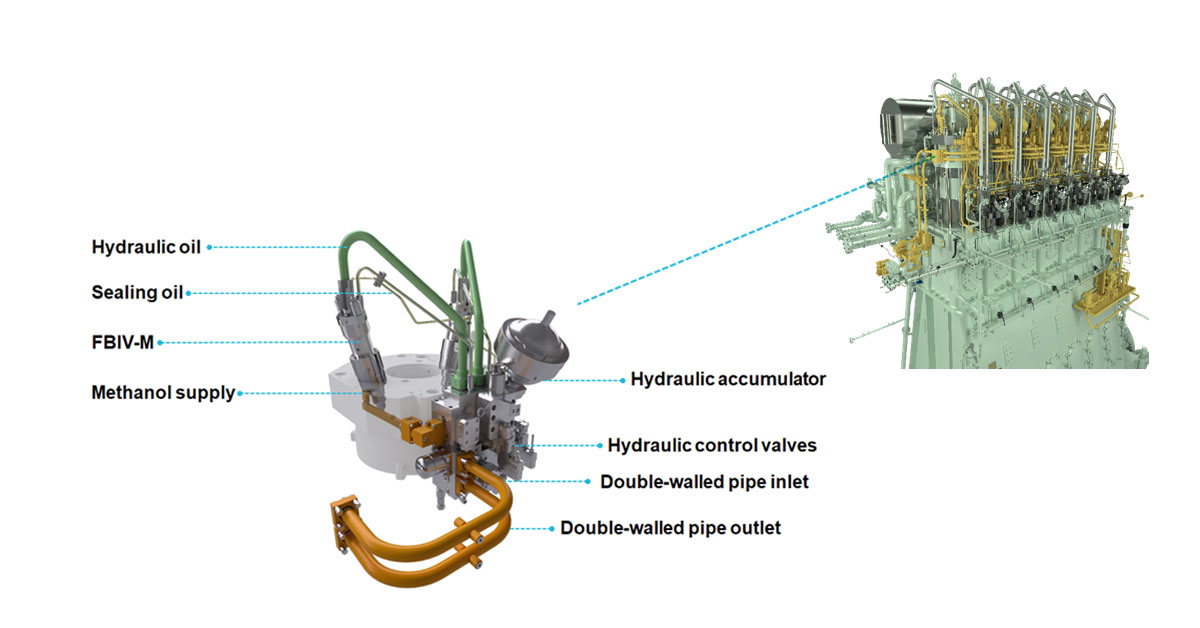Enabling a scalable energy transition
The MAN B&W ME-LGIM two-stroke dual-fuel engine can run on methanol as well as conventional fuels. Specifically designed to meet the needs of the maritime industry, it is a versatile and scalable solution that is suited to a wide range of vessel types. Simple handling, storage, and bunkering of methanol, combined with relatively simple auxiliary systems and the potential to be carbon-neutral, makes it an attractive option for meeting decarbonization targets.
Proven two-stroke methanol engine design
Available either for newbuilds or for upgrading existing conventional fuel vessels, this engine represents a proven, refined engine design based on over 600,000 running hours on methanol alone. Methanol produced from renewable sources is an attractive marine fuel option due to its low carbon intensity. An engine using green methanol can even provide carbon-neutral propulsion.
Key benefits
A new design for efficient methanol combustion
The ME-LGIM engine has inherited well-known components of our standard two-stroke diesel engine, like the ME-GI dual-fuel engine. Beneficial features of the standard MAN B&W two-stroke diesel engine have been retained. This illustration highlights methanol components and pipes that have been added to the cylinder top for methanol combustion.
The use of methanol as fuel type supports cost-effective vessel designs.

Moving together into a sustainable future
Learn more about the MAN B&W ME-LGIM engine
Continue reading
-
MAN B&W ME-LGIMpdf, 504 KB
Related products
Related News
Matson Takes Up Option for ME-GI Retrofit
Matson Navigation Company has confirmed that it will convert the main engine aboard its container ship, ‘Kaimana Hila’, from an MAN B&W S90ME-C10.5 unit to a dual-fuel ME-GI unit capable of running on LNG. In doing so, it is exercising an option contained in a contract it signed with MAN Energy Solutions in June 2022 to perform an identical conversion on a sister ship, the ‘Daniel K. Inouye’. The Kaimana Hila was built in 2019 and MAN Energy Solutions’ after-sales division, MAN PrimeServ, will perform the 3,600 teu vessel’s retrofit.
Klaus Rasmussen, Head of Projects and PVU Sales, MAN PrimeServ, said: “This order is the latest example in an increasing trend of owners choosing dual-fuel retrofits for their existing vessels in service to achieve fleet-transformation goals while simultaneously gaining benefits in terms of upcoming regulations such as CII and EEXI. Retrofitting an MAN B&W engine to dual-fuel running is straightforward as our standard, electronically-controlled diesel engines are constructed as ‘dual-fuel ready’ and therefore readily retrofittable. Such retrofits offer a viable pathway to shipowners that wish to achieve a net-zero carbon footprint by 2050.”
“This will be the third vessel Matson is retrofitting with dual-fuel LNG capability. Each retrofit is a meaningful step toward achieving our corporate sustainability goals to achieve a 40% reduction in Scope 1 greenhouse gas fleet emissions by 2030 and net-zero Scope 1 GHG emissions by 2050,” said Capt. Jack Sullivan, Matson’s Senior Vice President, Vessel Operations & Engineering.
The option take-up comes on the heels of the recent announcement by Matson of the construction of three LNG-powered newbuilds that will also be driven by ME-GI engines.
Dual-Fuel retrofits – a valid decarbonisation pathway
MAN Energy Solutions continually develops class-leading technologies that enable customers to meet environmental and commercial goals, as well as today and tomorrow’s regulatory standards. Since the first two-stroke ME-GI (LNG) retrofit in 2015, the company has built an impressive list of references and expanded its portfolio of dual-fuel retrofits to also include fuels like LPG and methanol.
Retrofitting a dual-fuel engine is one of the most effective ways to derive greater efficiency and profitability from a shipping fleet. As such, a dual-fuel conversion delivers the fuel flexibility to take advantage of optimal fuel prices; it can also help vessels comply with IMO emission targets and extend their operational lifetimes to bring a greater return on investments.
About Matson
Founded in 1882, Matson (NYSE: MATX) is a leading provider of ocean transportation and logistics services. Matson provides a vital lifeline of ocean freight transportation services to the domestic non-contiguous economies of Hawaii, Alaska, and Guam, and to other island economies in Micronesia. Matson also operates premium, expedited services from China to Long Beach, California, provides service to Okinawa, Japan and various islands in the South Pacific, and operates an international export service from Dutch Harbor to Asia. The Company's fleet of owned and chartered vessels includes containerships, combination container and roll-on/roll-off ships and custom-designed barges. Matson Logistics, established in 1987, extends the geographic reach of Matson’s transportation network throughout North America and Asia. Its integrated, asset-light logistics services include rail intermodal, highway brokerage, warehousing, freight consolidation, supply chain management, and freight forwarding to Alaska. Additional information about the Company is available at www.matson.com.
Documents
-
PR Matson ME-GI Option_EN
Contact
Nils Søholt
Trade Press Marine
Group Communications & MarktingMAN Energy SolutionsTeglholmsgade 412450 Copenhagen SVDenmark
nils.soeholt@man-es.com t +45 33 85 26 69Available languages
- DE ·
- EN
Get notified about press releases
Alternative fuels for your two-stroke powered vessel: Ammonia, methanol and methane in focus
Watch the recording of our latest MAN ExpertTalk on alternative fuels for large merchant marine vessels. Get insights into the most promising marine fuels of the expected future fuel mix for two-stroke vessels, namely ammonia, methanol and methane.
You can also look forward to hearing about the latest product developments and applications as well as reasons why these fuels have the potential to offer a straightforward path for the future maritime energy transition.
